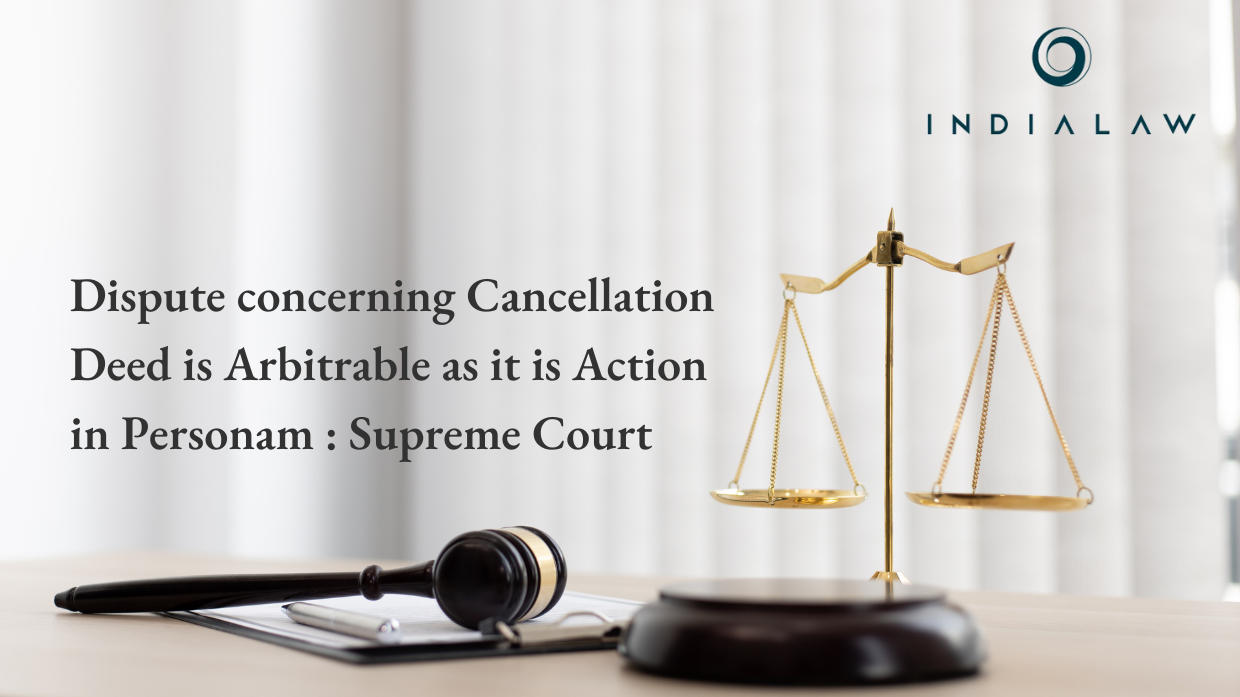Dispute concerning Cancellation Deed is Arbitrable as it is Action in Personam : Supreme Court

The Supreme Court (“SC”) recently in Sushma Shivkumar Daga & Ors. v. Madhukumar Ramkrishnaji Bajaj & Anr. [i] expanded the scope of arbitration. The SC upheld the arbitrability of a property dispute including a cancellation of a deed.
The matter was heard by the division bench comprising Justice Aniruddha Bose and Justice Sudhanshu Dhulia who dismissed the argument that cancellation of a deed is non-arbitrable for being an “action in rem” rather classified it as “action in personam” the Court concluded it to be arbitrable.
Action in rem and action in personam
For reader’s ease, an ‘action of rem’ means an action that can be taken against all, like for violation of Constitutional rights. Whereas an ‘action in personam’ refers to a claim against an individual, such as under contractual obligations.
Facts of the case
In a civil suit, Sushma Shivkumar Daga & Ors. (the appellants/ plaintiffs in the civil suit), sought annulling a Conveyance Deed and termination of registered Development Agreements. This led to a dispute between the parties.
Madhukumar Ramkrishnaji Bajaj & Anr. (defendants/ now respondents), invoked Section 8 of the Arbitration & Conciliation Act, 1996 (Act) relying on Tripartite Agreements having the arbitral clause. It was contended that Tripartite agreements formed the basis of the Conveyance Deed and the Development Agreements which are subject matter of the suit. The Lower Court affirmed the contentions and referred the matter to Arbitration, on appeal the decision was upheld by the Bombay High Court (HC). This prompted the appellants to approach the SC.
Grounds of challenge/ Objections of the appellants:
There are three objections of the appellants on Section 8 application moved by the respondents.
- Absence of an arbitration clause in the Conveyance Deed and the Development Agreements.
- Suit filed by the appellants is for the cancellation of a document relating to immovable property, and it therefore amounts to an action in rem hence arbitration is not the remedy.
- Thirdly, the plea of fraud was raised by the appellants in their objection to Section 8 application.
Issue before the SC
Whether the Trial Court and the HC have rightly referred the matter to arbitration, or the dispute is not arbitrable, as there was no arbitration clause in the Conveyance Deed.
Analysis of the SC
The SC dismissed the first objection of the appellants that there is no arbitration clause in the Conveyance deed or Development Agreements.
To understand the rationale of the SC’s analysis, it is requisite to examine the arbitration clause contained in Tripartite Agreements. It reads “It is agreed between Parties that in the event of any disputes or differences between the Parties hereto about this Agreement or about any matter touching or arising from this Agreement, the parties shall refer such disputes and differences to the arbitration under the provisions of the Arbitration & Conciliation Act, 1996 or any statutory modification thereof.”
The division bench analyzed the 2015 amendments to Sections 8 and 11 of the Act and stressed on the limited role of the court in arbitration matters. It highlighted that the prime function of the court is to verify the existence of a valid arbitration agreement.
It added, “The basic purpose for bringing an amendment in Section 8 (as well as Section 11 of the Arbitration Act) was to minimize the scope of judicial authority in matters of arbitration, except on the ground where prima facie, no valid arbitration agreement exists.”
While placing reliance on several precedents including Booz Allen and Hamilton Inc. v. SBI Home Finance Limited and Others[1][ii] and Vidya Drolia v. Durga Trading Corporation[iii] the Court rejected the second objection of the appellants that the instant dispute is non-arbitrable. In Vidya Drolia Case (supra), the Court held that a reference under Section 8 or under Section 11 of the Act would only be declined in rare cases where the Court is certain that either the arbitration agreement is non-existent, or the dispute is itself “manifestly non-arbitrable”. In BSNL v. Nortel Networks[iv], the Court had held that reference to the Arbitral Tribunal can be declined by the Court, only if the dispute is non-arbitrable. Examining the precedents, the Court noted that the dispute does not fall in any of the categories deemed non-arbitrable in any of the cited cases.
The SC dismissed the contention that the dispute constituted an ‘action in rem’ referred to the decision in Deccan Paper Mills v. Regency Mahavir Properties[v] wherein it was already clarified that the suit for cancellation of a deed or a declaration of rights arising from the deed, would fall into ‘action in personam’ only.
The decision of the SC
The SC noted that although specific agreements do not include an arbitration clause but Tripartite Agreements that are the foundation for subsequent agreements include an arbitration clause. Hence, the respondent has correctly invoked the arbitration clause.
Rejecting the unsubstantiated fraud claim, the Court stressed that the arbitration clause cannot be invoked on bald allegations, only serious allegations can fall under the arbitrator’s jurisdiction.
The SC dismissed the appeal and upheld the decisions of the lower court and the HC. The Court concluded “The Trial Court and the High Court have rightly held that the broad language of the “arbitration clause” in the two Tripartite Agreements dated 31.03.2007 and 25.07.2008 would cover the dispute raised by the appellants before the Civil Court, and hence the case has been rightly referred for arbitration.”
Conclusion
The SC’s recent judgment will reduce the burden on the courts as it has expanded the scope of the Arbitration Act. It underscored that whether it is a suit for cancellation of a deed or a declaration of rights arising from the deed, the same would fall under the domain of ‘action in personam’ and hence it would be arbitral.
[i] Diary No.- 1164 – 2022
[ii] (2011) 5 SCC 532
[iii] (2021) 2 SCC
[iv] (2021) 5 SCC 738
[v] (2021) 4 SCC 786
By entering the email address you agree to our Privacy Policy.



